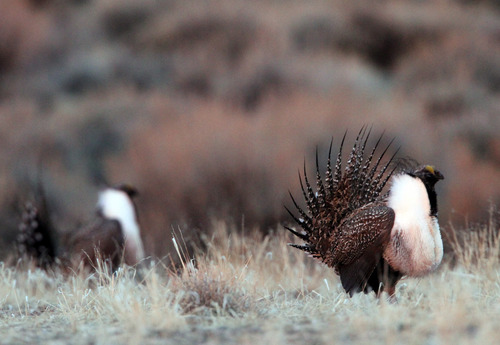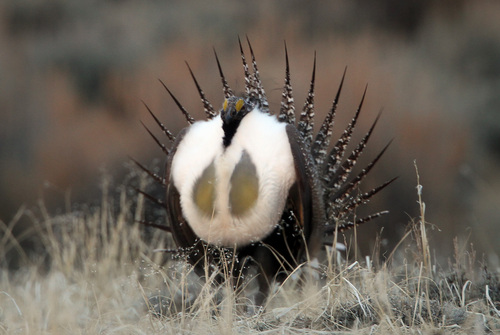This is an archived article that was published on sltrib.com in 2014, and information in the article may be outdated. It is provided only for personal research purposes and may not be reprinted.
Utah officials have awarded anti-predator activist Ryan Benson a $2 million contract to lobby Congress in hopes of delaying a decision about whether to provide federal protection to the greater sage grouse, a move that would wrest the bird's management from the states.
On Thursday, U.S. Rep. Cory Gardner, R-Colo., is expected to introduce a bill that would accomplish what Utah wants, according to his spokeswoman, Emily Hytha. She said Utah Republican Rep. Rob Bishop will be a co-sponsor.
Benson, a Bountiful lawyer and hunting enthusiast, has previously won state contracts to lobby for stripping federal protections from the gray wolf. That work, done while Benson worked for Utah nonprofit Big Game Forever, drew questions about how $600,000 in state dollars were spent, because they were commingled with funds from other sources.
The goal of the new effort is to give various Western states' conservation plans time to prove whether they can reverse the decline of the region's signature game bird, according to Mike Styler, executive director of the Utah Department of Natural Resources.
"Utah wants to see the sage grouse thrive and has invested extensively in measures to improve habitat and viability of the bird, recognizing that a listing [under the Endangered Species Act] would stop much of the state and private investment," Styler said. "The 10-year extension, asked for by Utah, will give adequate time to allow local actions and for the [U.S.] Fish and Wildlife Service to document the results and provide the best hope for the grouse to succeed."
The Utah Legislature authorized the $2 million appropriation during the past session. Lawmakers said a sage grouse listing would put a damper on energy development, grazing and motorized recreation, costing the state $20 billion to $40 billion.
Some conservationists say Utah, by injecting lobbyists into the sage grouse listing debate, is politicizing what should remain a scientific discussion.
Utah and other states are angling for an end run around an ample scientific record that indicates habitat loss has imperiled this once common inhabitant of the West's sagebrush steppe, according to Allison Jones, executive director of the Wild Utah Project.
"It's setting a precedent for the next species. They [Fish and Wildlife Service officials] are bringing together the latest peer-reviewed science," she said, "and when people say the service isn't using the best 'data,' they are talking about anecdotal observations."
Others wonder if putting off a listing decision is necessary.
"The states and the Bureau of Land Management are on track to put forward adequate regulatory mechanisms to conserve the species," said Megan Mueller, a biologist with Rocky Mountain Wild. "We have an opportunity to work together to conserve the bird. Utah would be better off spending that money improving its conservation measures for sage grouse. You can do a lot with $2 million."
The Fish and Wildlife Service has determined federal protection for the sage grouse is "warranted but precluded by higher priorities," and is now under a court order to make a final listing decision by Sept. 30, 2015.
While working for Big Game Forever, a spinoff from Sportsmen for Fish and Wildlife, Benson was twice awarded $300,000 by Utah for a campaign to remove federal protections for the gray wolf and return management of the keystone predator to the states.
While a federal decision on delisting the wolf in the lower 48 states has been put off, DNR officials have argued Big Game Forever's participation has moved the wolf closer to delisting.
The state awarded the sage grouse contract to Stag Consulting, a company Benson and his wife, Jennifer, formed in 2010 to provide legal consulting to Sportsmen for Fish and Wildlife. According to corporate filings, Salt Lake City attorney Jay Bell replaced Jennifer Benson as Stag's registered agent last week.
The sage grouse issue in some ways is a polar opposite to the wolf, involving a cherished game species that has yet to be listed under the Endangered Species Act. The wolf, on the other hand, was listed after it was deliberately exterminated across the West.
After its rebound in the Northern Rockies, the wolf remains reviled by many who have zero interest in seeing this canine recover. Some fear its taste for red meat could ruin ranchers and destroy big game if it is allowed to "proliferate" under federal protection.
Utah and other states, desperate to keep sage grouse management in local hands, have developed a strategy to challenge federal science on the bird's conservation status and seek congressional intervention on the listing decision. According to the state's request for proposals, greater sage grouse is in no immediate danger of extinction, with 500,000 birds spread around 60 million acres in the West. Utah's conservation plan has been in effect for a year, and officials say it is already benefiting the bird.
"It will take time for the conservation measures to bear fruit with this long-lived grouse species," the document says. "Population data can only be gathered with sufficient accuracy once a year, during the spring mating cycle."
To keep control of the bird's management, DNR will initiate a one-year contract with Stag Consulting, starting July 1, for developing "legal strategies; educating members of Congress; and engaging the public in the process." The consultant is to report to the Legislature quarterly.





